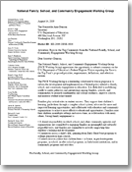The Harvard Family Research Project separated from the Harvard Graduate School of Education to become the Global Family Research Project as of January 1, 2017. It is no longer affiliated with Harvard University.

|
January 19, 2010 Commentary from the National Family, School, and Community Engagement Working Group on the Investing in Innovation (i3) FundNational Family, School, and Community Engagement Working Group |
Article Information
- Full Text (HTML)
- Full Text (PDF: 73 kb)
Read commentary submitted by HFRP
HFRP endorsed the Working Group's recommendations and submitted its own to reinforce the importance of family engagement.
About the Investing in Innovation (i3) Fund
Under the American Recovery and Reinvestment Act of 2009 (ARRA), the U.S. Department of Education has launched the $650 million Investing in Innovation (i3) Fund. This competitive grants program provides funds to local education agencies (LEAs) and nonprofit organizations with a proven record of using innovative practices to improve student achievement, close achievement gaps, decrease dropout rates, increase graduation rates, and improve the effectiveness of educators/school leaders. Through public–private partnerships, recipients will utilize grants to scale-up and develop promising initiatives, as well as create and document best practice models.
The National Family, School, and Community Engagement Working Group's Commentary
The National Family, School, and Community Engagement Working Group, a collaborative of leaders in the family engagement field, including Harvard Family Research Project’s (HFRP) Heather Weiss, submitted recommendations for the i3 Fund’s proposed priorities, requirements, definitions, and selection criteria.
The National Working Group recommends that family involvement be considered as a critical strategy in meeting i3 goals because family engagement is linked to higher educational achievement, reduction in behavioral problems, increased attendance, decreased dropout rates, and improved emotional and physical well-being. It recommends family engagement as a cost-effective way to attain these improved outcomes for all children, no matter what their background, in order to effectively close achievement gaps.
The National Working Group’s recommendations provide a framework for the integration of family involvement into how potential recipients of i3 funds are assessed and selected, as well as how initiatives are evaluated. The Group believes that adoption of these recommendations is essential to achieving the abovementioned i3 goals.
View comments submitted by HFRP
In addition to collaborating with the National Family, School, and Community Engagement Working Group, HFRP submitted its own set of comments to complement those of the National Working Group and reinforce the message that family engagement should be a priority in applicants’ plans for using i3 dollars. Read HFRP’s endorsement of the Working Group’s comments.
About The National Family, School, and Community Engagement Working Group
The National Family, School, and Community Engagement Working Group was created to inform educational policy on family engagement and in so doing, to improve educational opportunities for all children, from cradle to career. We present a broadened definition of family engagement and a platform to strengthen it in education reform efforts.
Free. Available online only.
